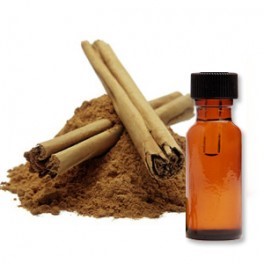Contents
Uses
- Promotes circulation both internally and when applied to the skin
- Maintains a healthy immune system
- Promotes oral health
- Helps alleviate sore muscles and joints
- Long used to flavor food and for its internal health benefits
Benefits
- Brain Function: Cinnamon boosts the activity of the brain and makes it a good brain tonic. It helps to remove nervous tension and memory loss. Research at the Wheeling Jesuit University in the United States has proved that the scent of cinnamon has the ability to boost brain activity. The team of researchers, led by Dr. P. Zoladz, found that people who were given cinnamon improved their scores on cognitive activities such as attention span, virtual recognition memory, working memory, and visual-motor response speed.
- Blood purification: Cinnamon can also help to remove blood impurities. This also makes it a great treatment for pimples.
- Blood circulation: Cinnamon helps to improve the circulation of blood due to the presence of a blood thinning compound within cinnamon. This blood circulation helps to significantly reduce pain. Good blood circulation also ensures oxygen supply to the body’s cells, which leads to higher metabolic activity. You can significantly reduce the chance of suffering from a heart attack by regularly consuming cinnamon.
- Pain Relief: Cinnamon is also an anti-inflammatory substance, so it helps in removing stiffness of the muscles and joints. Cinnamon is also recommended for arthritis, and it is known to help in removing headaches that are caused by colds.
- Diabetes: Cinnamon has the ability to control blood sugar, so diabetics find it very useful because cinnamon aids them in using less insulin. Research has shown that it is particularly helpful for patients suffering from type 2 diabetes. Type 2 diabetes patients are not able to regulate their insulin levels properly. Researchers at the US Department of Agriculture’s Human Nutrition Research Center in Beltsville, Maryland studied the effect of various food substances that include cinnamon on blood sugar levels. They found that a water-soluble polyphenol compound called MHCP, which is abundant in cinnamon, synergistically acted with insulin and helped in the better utilization of that vital component of human health.
- Infections: Due to its antifungal, antibacterial, antiviral and antiseptic properties, it is effective on treating external as well as internal infections. It helps in destroying germs in the gall bladder and the bacteria present in staph infections.
- Healing: Cinnamon acts as a coagulant and helps to stop excess bleeding. Therefore, it facilitates the healing process.
- Heart diseases: It is believed that the calcium and fiber present in cinnamon provide protection against heart diseases. By including a little cinnamon in your food, you can help prevent coronary artery disease and high blood pressure.
- Colon cancer: It can also improves the health of the colon and thereby reduce the risk of colon cancer.
- Mouth freshener: Cinnamon is often used in chewing gums, as it is a good mouth freshener and removes bad breath.
- Perfumes: It has a refreshing aroma and is extensively used in perfume-making.
- Indigestion: Cinnamon is added in many ethnic recipes. Apart from adding flavor to the food, it also aids in digestion. Cinnamon is very effective for indigestion, nausea, vomiting, upset stomach, diarrhea and flatulence. Due to its carminative properties, it is very helpful in eliminating excess gas from the stomach and intestines. It also removes acidity, combats diarrhea and reduces the effects of morning sickness. Cinnamon is therefore often referred to as a digestive tonic.
- Respiratory problems: Cinnamon helps in relieving the symptoms of colds, influenza, sore throat and congestion.
- Menstruation: Cinnamon is effective in providing relief from menstrual discomfort and cramping.
- Birth control: Cinnamon also helps in natural birth control. Regular consumption of cinnamon after child birth delays menstruation and thus helps to avoid conception.
- Breastfeeding: It is also believed that cinnamon aids in the secretion of healthy breast milk.
- Cinnamon is diuretic in nature and helps in the secretion and discharge of urine. It is also commonly used as an aphrodisiac and is believed to arouse sexual desire in men and women.
Cautions
- Allergic reactions – highly sensitive people can develop allergic reactions when cinnamon oil is taken. It shows as skin irritation such as itching and rashes spreading on the body.
- Burning sensation and pain – people who have ulcers in the mouth will feel a burning sensation and pain right after consuming cinnamon oil.
- Increased heart rate – for highly sensitive individuals. In relation to these, they can also experience dyspnea.
- Stomach irritation – cinnamon oil can irritate your digestive tract. You may experience nausea, stomach pain and diarrhea. This may result immediately after taking cinnamon oil, but will subside thereafter. If the problem persists, seek the advice of a medical professional.
- Breathing problems – if you are a highly sensitive person, your respiratory tract may be irritated by cinnamon oil. You can experience shortness of breath, chest pains and wheezing. Seek the help of a medical provider. Lack of intervention may cause loss of consciousness.
- Adverse drug interactions – if you are taking certain medications and you take cinnamon oil, it may result in adverse drug interactions. You may experience dizziness, headache, fatigue and hunger.
Interactions
Unknown, please consult with your doctor.
Other names
n/a
Reference
Source: Organic Facts, https://www.organicfacts.net/health-benefits/essential-oils/health-benefits-of-cinnamon-oil.html
SustainableBabySteps, http://www.sustainablebabysteps.com/cinnamon-oil.html

